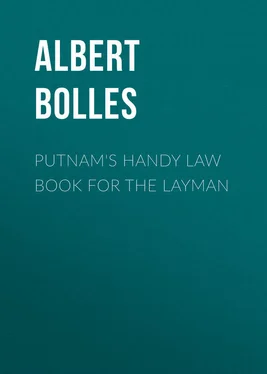Albert Bolles - Putnam's Handy Law Book for the Layman
Здесь есть возможность читать онлайн «Albert Bolles - Putnam's Handy Law Book for the Layman» — ознакомительный отрывок электронной книги совершенно бесплатно, а после прочтения отрывка купить полную версию. В некоторых случаях можно слушать аудио, скачать через торрент в формате fb2 и присутствует краткое содержание. Издательство: Иностранный паблик, Жанр: foreign_antique, foreign_prose, на английском языке. Описание произведения, (предисловие) а так же отзывы посетителей доступны на портале библиотеки ЛибКат.
- Название:Putnam's Handy Law Book for the Layman
- Автор:
- Издательство:Иностранный паблик
- Жанр:
- Год:неизвестен
- ISBN:нет данных
- Рейтинг книги:5 / 5. Голосов: 1
-
Избранное:Добавить в избранное
- Отзывы:
-
Ваша оценка:
- 100
- 1
- 2
- 3
- 4
- 5
Putnam's Handy Law Book for the Layman: краткое содержание, описание и аннотация
Предлагаем к чтению аннотацию, описание, краткое содержание или предисловие (зависит от того, что написал сам автор книги «Putnam's Handy Law Book for the Layman»). Если вы не нашли необходимую информацию о книге — напишите в комментариях, мы постараемся отыскать её.
Putnam's Handy Law Book for the Layman — читать онлайн ознакомительный отрывок
Ниже представлен текст книги, разбитый по страницам. Система сохранения места последней прочитанной страницы, позволяет с удобством читать онлайн бесплатно книгу «Putnam's Handy Law Book for the Layman», без необходимости каждый раз заново искать на чём Вы остановились. Поставьте закладку, и сможете в любой момент перейти на страницу, на которой закончили чтение.
Интервал:
Закладка:
When an agency is terminated it is often needful for the principal to notify all customers for his protection, otherwise they might continue to do business with the agent, supposing he was thus acting, and involve him perhaps in heavy loss. This rule applies especially to partnerships, each member of which is an agent with general authority to do the kind of business in which it is engaged.
If the authority of an agent in writing is revoked, but is still left with him and is shown to a third person who, having no knowledge of the revocation, makes a contract with him, the principal will be held for its execution.
Another rule of law may be given. The law assumes that any knowledge acquired by an agent concerning his principal's business, will be communicated to his principal, who is bound thereby. This rule though is often difficult to apply. Thus, if a cashier of a bank should learn that a note was defective, which was afterward discounted by his bank, it would be regarded as having knowledge of the defect, because it was the cashier's duty to inform the proper officials before they discounted it.
The death of either agent or principal terminates the agency except in cases of personal interest. And when an agent has appointed a substitute or subagent without direct authority, and for his own convenience, the agent's death annuls the authority of the subagent or substitute, even though the agent was given the right of substitution. But if the subagent's authority is derived directly from the principal, it is not affected by the agent's death.
Agreement to Purchase Land.– An agreement to purchase land must be in writing to be valid. Oral or parol agreements may be made to do many things, but everywhere the law makes an exception of agreements relating to land purchases. A statute that is quite similar in the states requires this agreement to be in writing and signed by the party against whom it is to be enforced. Thus if the seller wishes to enforce such an agreement, he must produce a writing signed by the purchaser; if the latter wishes to hold the seller, he must do the same thing. The better way is to have the writing signed by both parties.
How complete must the writing be? It need not mention the sum to be paid for the land; it can be signed with a lead pencil: a stamp signature will suffice. The entire agreement need not be on one piece of paper. If it can be made out from written correspondence between the two parties this will be enough.
To this rule of law are some exceptions. Therefore if an oral agreement for the sale of land is followed by putting the buyer into possession, the law will compel the seller to give him a deed. The proceeding would consist of a petition addressed to a court of equity, which would inquire into the facts, and if they were true, would compel the seller to give the purchaser a deed of the land. The reason for making this exception is, the purchaser would be a trespasser had he no right to be there: to justify his possession the law permits him to prove, if he can, his purchase of the land; and if he has bought it, of course he ought to have a deed of his title.
Once, a purchaser who made an oral agreement and paid part of the purchase money could compel the seller to give him a deed, and many still think such action is sufficient to bind the bargain. This is no longer the law. The practice gave rise to much fraud: A would assert that he gave money to B to pay for land when in truth it was given for some other purpose. So the courts abandoned the rule founded on the part payment of the purchase price. A can however get back his money.
An option to purchase land, contained in an agreement to sell, must be exercised within a reasonable time, if none is fixed in the agreement. See Deed .
Auctioneer.– An auctioneer, employed by a person to sell his property, is primarily the owner's agent only, and he remains his exclusive agent to the moment when he accepts the purchaser's bid and knocks down the property to him. On accepting the bid the auctioneer is deemed to be the agent of the purchaser also, so far as is needful to complete the sale; he may therefore bind the purchaser by entering his name to the sale and by signing the memorandum thereof. His signing is sufficient to satisfy the Statute of Frauds in any state conferring on an agent authority to make and contract for the sale of real and personal property without requiring his authority to be in writing. His agency may begin before the time of the sale and continue after it. Again, the entry of the purchaser's name must be made by the auctioneer or his clerk immediately on the acceptance of the bid and the striking down of the property at the place of sale. It cannot be made afterward. The auctioneer at the sale is the agent of the purchaser who by the act of bidding calls on him or his clerk to put down his name as the purchaser. In such case there is little danger of fraud. If the auctioneer could afterward do this he might change the name, substitute another, and so perpetrate a fraud.
A sale by auction is complete by the Sales Act when the auctioneer announces its completion by the fall of the hammer, or in other customary manner. Until such announcement is made, any bidder may retract his bid; and the auctioneer may withdraw the goods from sale unless the auction has been announced to be without reserve.
Authority may be conferred on an auctioneer in the same manner as on any other agent for the sale of similar property, verbally or in writing. Even to make a contract for the sale of real estate, oral authority to the auctioneer is sufficient, in the absence of a statute to the contrary.
Authority to sell property does not of itself imply authority to sell it at auction, and the purchaser therefore who has notice of the agent's authority or knowledge sufficient to put him on inquiry, acquires no title to the property thus purchased. If goods are sent to an auction room to sell, this is deemed sufficient evidence of authority to sell them in that manner and to protect whoever buys them.
As an auctioneer is ordinarily a special agent, the purchaser is supposed to know the terms and conditions imposed by the seller on the agent. The seller or owner therefore is not bound by any terms stated by the auctioneer differing from those given to him. If the owner has imposed no terms on him, then he has the implied authority usually existing in such cases.
An auctioneer has authority to accept the bid most favorable to the seller when the sale is made without reserve and to strike down the property to the purchaser. He cannot therefore consistently with his duty to his principal refuse to accept bids, unless the bidder is irresponsible or refuses to comply with the terms of the sale. He is justified in rejecting the bids of insane persons, minors, drunken persons, trustees of the property, and perhaps in some cases of married women.
An auctioneer cannot transfer his duty to another. This rule does not prevent him from employing others to do incidental things connected with the keeping and the moving of the property. He cannot sell on credit contrary to his instructions or custom; nor would he be secure in following custom if instructed to do otherwise. After the bid has been accepted the bidder has no authority to withdraw it without the owner's consent, nor can he be permitted to do so by the auctioneer. Nor can he sell at private sale if his instruction is to sell publicly, nor can he justify himself even if he acted in good faith and sold the property for more than the minimum price fixed by the owners. Nor can he sell the property to himself, nor authorize any other person to bid and purchase for him either directly or indirectly. It is impossible with good faith to combine the inconsistent capacities of seller and buyer, crier and bidder, in one and the same transaction.
Читать дальшеИнтервал:
Закладка:
Похожие книги на «Putnam's Handy Law Book for the Layman»
Представляем Вашему вниманию похожие книги на «Putnam's Handy Law Book for the Layman» списком для выбора. Мы отобрали схожую по названию и смыслу литературу в надежде предоставить читателям больше вариантов отыскать новые, интересные, ещё непрочитанные произведения.
Обсуждение, отзывы о книге «Putnam's Handy Law Book for the Layman» и просто собственные мнения читателей. Оставьте ваши комментарии, напишите, что Вы думаете о произведении, его смысле или главных героях. Укажите что конкретно понравилось, а что нет, и почему Вы так считаете.












